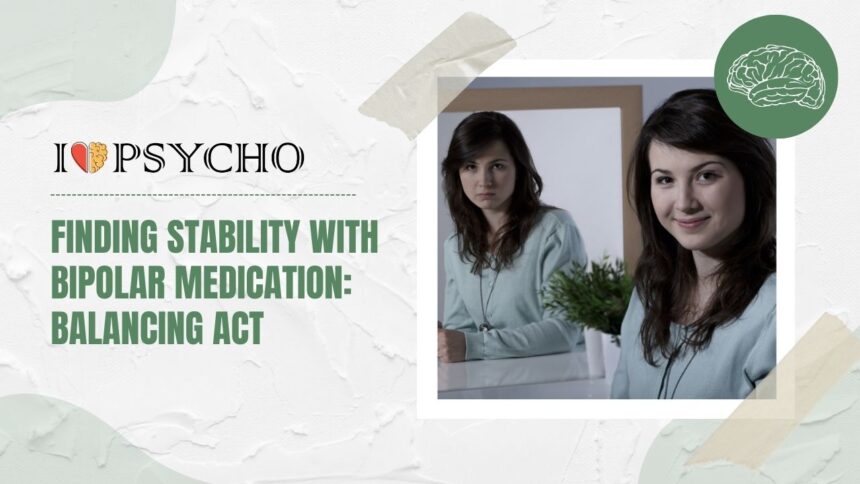Introduction to Bipolar Disorder
Living with bipolar disorder can feel like navigating a rollercoaster of emotions. The highs and lows can be intense, making everyday life a challenge. But there is hope! With the right medication and support, finding stability is possible. Let’s explore how balancing medication, therapy, and lifestyle changes can help you on your journey to managing bipolar disorder effectively.
The Importance of Medication for Bipolar Disorder
Living with bipolar disorder can be a challenging journey, marked by unpredictable highs and lows that affect daily life. Medication plays a crucial role in managing symptoms and achieving stability. It helps regulate mood swings, reduce the frequency of episodes, and improve overall quality of life.
For many individuals with bipolar disorder, finding the right medication can make a significant difference in their well-being. From mood stabilizers to antipsychotics and antidepressants, there are various options available to address different aspects of the condition. Working closely with a healthcare provider is essential to determine the most effective treatment plan tailored to individual needs.
While medication alone may not be a cure for bipolar disorder, it is an important tool in symptom management. Alongside therapy and lifestyle changes, finding the right balance of medication can help individuals lead fulfilling lives despite their diagnosis. Regular communication with healthcare providers is key to monitoring progress and making necessary adjustments along the way.
Remember, seeking treatment for bipolar disorder is not a sign of weakness but rather a proactive step towards taking control of your mental health.
Types of Medications Used for Bipolar Disorder
When it comes to managing bipolar disorder, medications play a crucial role in stabilizing mood swings. There are different types of medications used to treat this condition, each targeting specific symptoms.
Mood stabilizers like lithium help regulate mood fluctuations and prevent manic episodes. Anticonvulsants such as valproic acid can also be effective in controlling manic episodes.
Atypical antipsychotics like quetiapine may be prescribed to manage both mania and depression symptoms. They work by affecting neurotransmitters in the brain associated with mood regulation.
Antidepressants are sometimes used cautiously in combination with mood stabilizers for treating depressive episodes. However, they are typically avoided as standalone treatments due to the risk of triggering manic episodes.
Finding the right medication regimen often involves trial and error under the guidance of a healthcare provider specialized in treating bipolar disorder. It’s essential to work closely with your doctor to determine the most suitable medication plan tailored to your individual needs.
Common Side Effects of Bipolar Medications
Navigating the world of bipolar medications can come with its own set of challenges. While these medications are crucial in managing symptoms, they can also bring about some common side effects that may impact your daily life.
It’s not uncommon to experience drowsiness, weight gain, or even tremors when taking certain bipolar medications. These side effects can vary from person to person and may require adjustments in dosage or medication type.
Some individuals may also notice changes in their libido or disruptions in their sleep patterns while on medication. These side effects can be frustrating but communicating openly with your healthcare provider is key in finding solutions.
Remaining mindful of how these side effects affect you personally is essential. Keeping track of any changes and discussing them with your doctor will help tailor a treatment plan that works best for you.
Balancing Medication with Therapy and Lifestyle Changes
Finding a balance between medication, therapy, and lifestyle changes is key in managing bipolar disorder effectively. Medication can help stabilize mood swings, but combining it with therapy can provide valuable coping strategies and emotional support.
Therapy sessions offer a safe space to explore thoughts and emotions, learn healthy coping mechanisms, and improve communication skills. It complements medication by addressing underlying issues that contribute to mood disturbances.
Incorporating positive lifestyle changes like regular exercise, balanced nutrition, adequate sleep, and stress management techniques further enhances the effectiveness of treatment. Physical well-being plays a significant role in mental health stability.
Remember that each individual’s journey towards finding stability is unique; what works for one may not work for another. Experimenting with different combinations of medication, therapy approaches, and lifestyle adjustments is essential to discovering what best suits your needs.
Finding the Right Medication and Dosage for You
When it comes to managing bipolar disorder, finding the right medication and dosage is crucial. It’s not a one-size-fits-all approach – what works for one person may not work for another. This process often involves trial and error, working closely with your healthcare provider to monitor how different medications affect you.
Your doctor will consider various factors like your symptoms, medical history, and any other medications you’re taking before deciding on the best treatment plan. They may start with a low dose and gradually adjust it based on how you respond. It’s important to be patient during this process as finding the optimal medication and dosage can take time.
Keep track of how you feel both physically and mentally while taking the medication. Be open with your doctor about any side effects or concerns you have so they can make informed decisions about adjusting your treatment plan if needed. Remember, finding the right balance is key to effectively managing bipolar disorder.
Tips for Maintaining Stability with Bipolar Medication
Navigating the world of bipolar medication can be challenging, but there are tips to help maintain stability. It’s crucial to take your medication as prescribed by your healthcare provider without skipping doses or making changes without consulting them first. Developing a routine for taking your medication can help you stay on track and avoid missing doses.
It’s essential to communicate openly with your doctor about how you’re feeling and any side effects you may be experiencing. They can work with you to adjust your medication if needed. Additionally, staying consistent with therapy appointments and practicing healthy lifestyle habits like regular exercise, proper nutrition, and sufficient sleep can complement the effects of medication in managing symptoms.
Finding a support system of family, friends, or a therapist can provide emotional support during challenging times. Educating yourself about bipolar disorder and its treatment options can empower you to make informed decisions about your care. Remember that finding stability is an ongoing process that requires patience and perseverance in finding what works best for you.
Staying Educated and Communicating with Your Doctor
Staying educated about your bipolar medication is crucial for managing your condition effectively. Make sure to research and understand the medications prescribed to you. Knowledge empowers you to make informed decisions regarding your treatment plan.
Communicating openly with your doctor is key in finding the right balance of medication for your unique needs. Be honest about any side effects or concerns you may have. Your doctor is there to support and guide you through this journey towards stability.
Ask questions, seek clarification, and express any changes in how you are feeling. Remember, finding the right medication regimen often involves a process of trial and error until the optimal solution is found.
Regular check-ins with your healthcare provider can help monitor progress and adjust treatment as needed. Stay proactive in advocating for yourself and working collaboratively with your medical team to achieve stability in managing bipolar disorder.
Coping with Fluctuations
Navigating the ups and downs of bipolar disorder can feel like a rollercoaster ride, with mood swings that can be unpredictable and challenging to manage. Coping with these fluctuations is a key aspect of maintaining stability in your life.
During times of manic or hypomanic episodes, it’s crucial to practice self-awareness and recognize the signs that indicate you may need to reach out for support. Engaging in calming activities such as mindfulness exercises or creative outlets can help ground you during these high-energy periods.
Conversely, when experiencing depressive episodes, it’s important to prioritize self-care and seek professional help if needed. Surround yourself with a strong support system, whether it’s friends, family, or a therapist who can offer guidance and understanding.
Remember that coping with fluctuations is an ongoing process that requires patience and resilience. By actively participating in your treatment plan and staying attuned to your emotions, you can better navigate the ebbs and flows of bipolar disorder.
Conclusion
Finding stability with bipolar medication is a journey that requires patience, persistence, and open communication with your healthcare provider. Remember that managing bipolar disorder is not just about taking medication; it’s also about incorporating therapy, lifestyle changes, and self-care practices into your routine.
By understanding the importance of finding the right medication and dosage for you, being aware of common side effects, and staying educated on your condition, you can take control of your mental health. It’s essential to remember that everyone’s experience with bipolar disorder is unique, so what works for one person may not work for another.
Stay committed to your treatment plan, keep track of any fluctuations or changes in your mood or symptoms, and don’t hesitate to reach out for help when needed. With the right support system in place and a proactive approach to managing your mental health, you can find stability and lead a fulfilling life despite the challenges of bipolar disorder.









